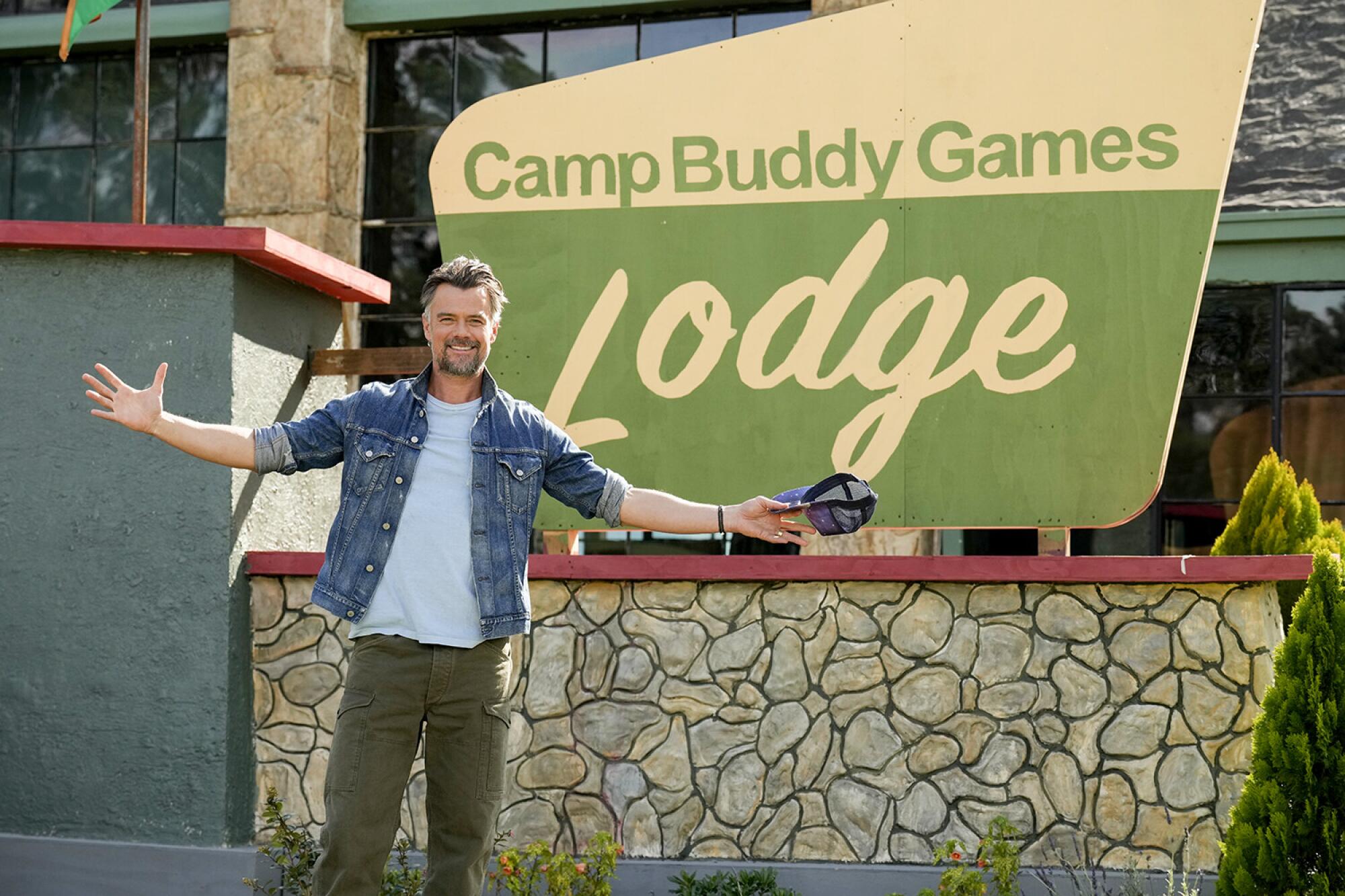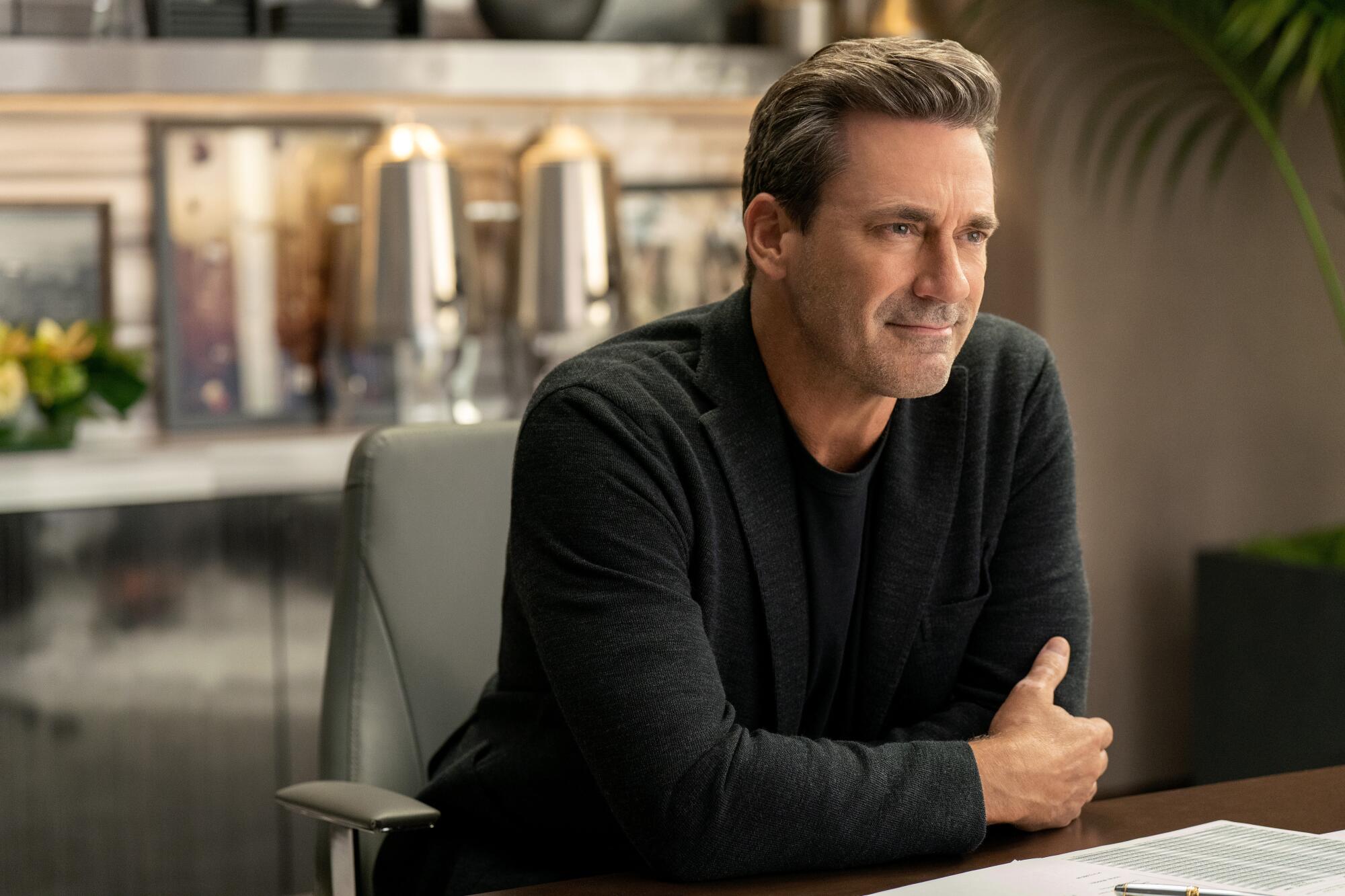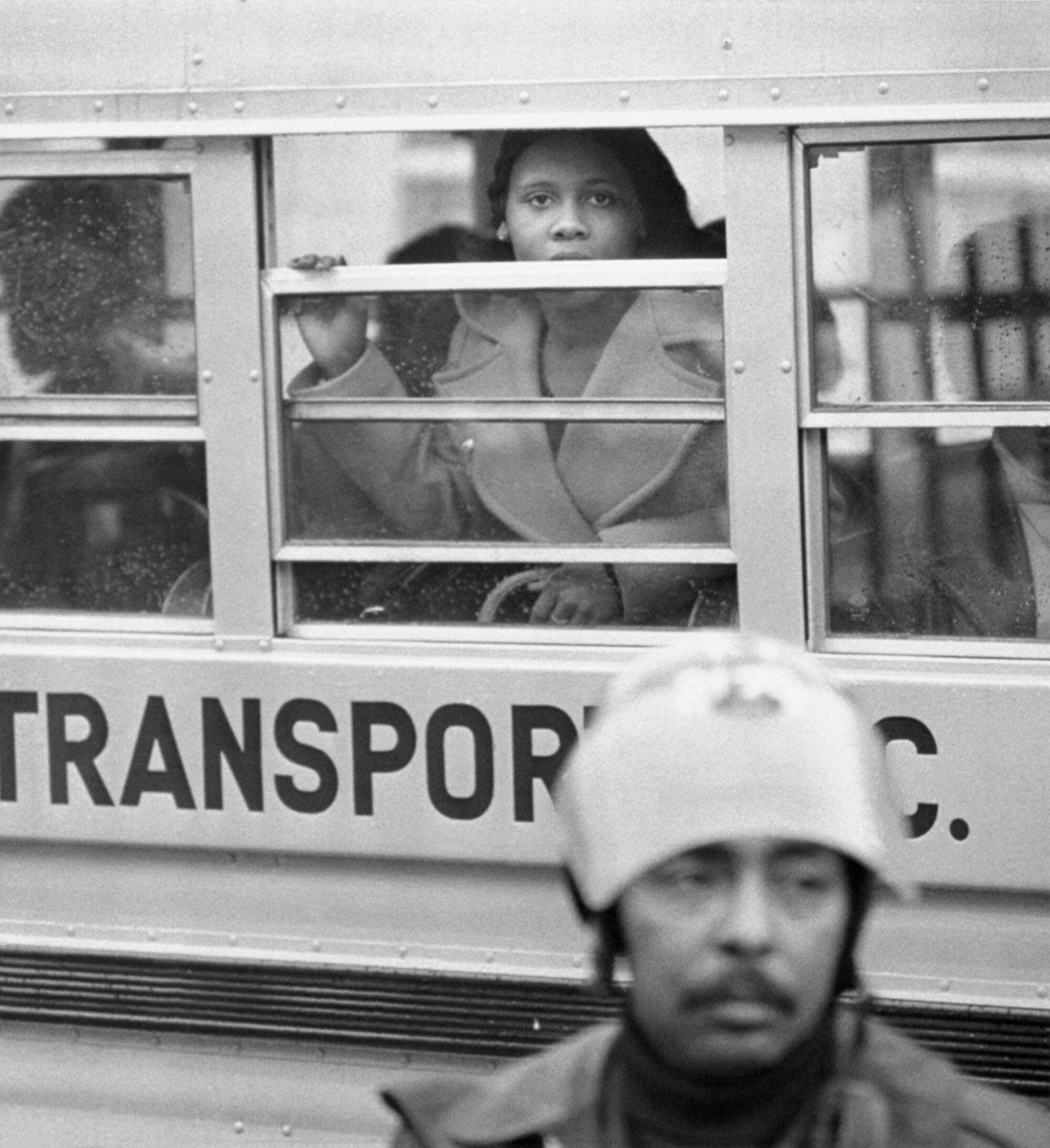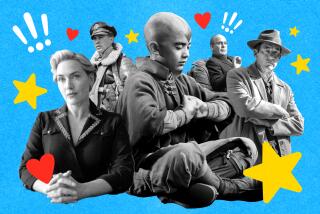
- Share via
Though television brings out new shows any old time, we continue to think of it as a thing with seasons. We remain compelled by the promise of fall, when the broadcast networks bring in their harvest, as other platforms continue their year-round run of releases. We greet the fall season with an air of anticipation, of occasion, and we celebrate it with special issues of pop culture magazines and newspaper packages like this. It gives us of a sense of things in their place, of the regular, reliable rotation of the Earth. Heaven knows we need that.
This year, as in the first flush of the pandemic, that rotation is a little off its axis. The proximate cause is, of course, the writers’ and actors’ strikes — or the producers’ recalcitrance, if you prefer — unsettled and unsettling as of this writing; but were they to end before you finished reading this sentence, the disruption will have been done.
And yet! Television goes on, with some pretense of normalcy. Broadcasters will find ways to fill their prime-time grids; streamers will spread out their wares to simulate abundance. There will be imports. As Times television critics Lorraine Ali and Robert Lloyd write, the near future will offer — or continue to offer — TV, including shows that are neither scripted nor acted nor new.
Far from there being no television to watch, there will still be more television than you can watch.
Watch people compete for cash and love

As expected, we will be seeing a lot of game shows this fall.
Though it can seem the poor relation of “real” television, the game show has a long history with the medium. We are born gamers, after all — they were playing backgammon in ancient Mesopotamia and pachisi in ancient India, and who knows what prehistoric amusements before that. (Anyone for rocks and sticks?) Their cultural influence has been enormous. When someone says, “That’s the $64 question” (later inflated to $64,000), they are referring, whether or not they know it, to a quiz show. “Survey says,” “Come on down” and “Say the secret word and win $100” entered the lexicon by way of “Family Feud,” “The Price Is Right” and “You Bet Your Life.” Game shows have made contestants famous, hosts iconic, and provided the template for innumerable sketches on “Saturday Night Live.” The question of who would replace the irreplaceable Alex Trebek on “Jeopardy!” was a subject of national debate; more recently, Vanna White’s temporary absence from “Wheel of Fortune” was reported as news.
Nearly gone now from daytime TV, a turf that, alongside soap operas, they once owned, game shows have come and gone and come again to prime time over the years; they have flourished in syndication; and, especially, if we include “reality competitions” — which are just game shows with a serial element in an exotic setting, or tailored to specific skills (singing, baking, proving oneself more attractive to attractive people than other attractive people, etc.) — they have become increasingly available on streaming platforms. With their clocks and quizzes, spaceship sets, genial hosts and amusing panelists, and play-along element, they have a sparkly appeal and have at times even threatened the health of scripted television: Because they are comparatively cheap to produce, which endears them to producers, a million dollars may be given away as if it were a year’s supply of Rice-a-Roni — which endears them to viewers.
Apart from “20/20” and reruns of “Abbott Elementary,” ABC’s announced fall lineup is almost entirely devoted to game shows, or reality shows with competitive components, including “Dancing With the Stars,” “Celebrity Jeopardy!” (Sept. 27), “Celebrity Wheel of Fortune” (Sept. 27) and the latest iteration of the “Bachelor” franchise, “The Golden Bachelor” (Sept. 28). NBC, by contrast, has only “The Wall” (Nov. 3) and “The Voice” (Sept. 25) coming back. CBS will launch “Buddy Games” (Sept. 14), inspired by the real-life adventures of host Josh Duhamel, in which teams of friends compete in a summer-camp setting, and “Loteria Loca” (Oct. 2), based on the centuries-old Mexican bingo game, with, you know, a twist. “The Amazing Race” (Sept. 27) will expand to 90 minutes, the better to eat up actorless-writerless prime time. Fox has, among other game shows, the returning and bizarrely popular “The Masked Singer” (Sept. 10) and “Name That Tune” (Sept. 19) (not quite as old as backgammon) and the new “Snake Oil” (Sept. 27), a sort of “Shark Tank” with an element of fraud, hosted by David Spade. Not to be left out, the CW is taking over “FBoy Island” (Oct. 12) from Max. (“The Dating Game,” what hath you wrought?)
This is merely a partial list.
— Robert Lloyd
A few favorites return, along with spinoffs

Here’s some good news for those who’ve tried but failed to keep up with all the “must-watch TV” suggestions from family, friends and random co-workers. There’s a chance you may be able to catch up this fall thanks to a slowdown in the production of new series. Pandemic shutdowns, studio economics and now the SAG-AFTRA and WGA strikes mean there are fewer notable scripted shows being released, signaling a reprieve for audiences who are still backlogged somewhere in Season 4 of “Better Call Saul.”
Not only that, networks and streamers are rationing the content they do have by pushing back premiere dates of new arrivals and staggering the release of returning series to avoid programming pileups. So what can we look forward to? A lot, as it turns out. The return of highly anticipated series defines the fall season. But there’s no need to cram-watch because this group of titles arrives at a relatively sane pace over the next few months, at least compared to the onslaught of TV we’ve become accustomed to fielding.
Disney+ welcomes back one of the most popular installments from its Marvel collection, “Loki” (Oct. 6). Tom Hiddleston reprises his lead role in this comic-book-inspired drama about the time-hopping God of Mischief. Fans of Netflix’s French thriller “Lupin” have waited nearly three years for part three of the gentlemen thief’s story, so the excitement about his return on Oct. 5 is palpable. Fans of Apple TV+‘s “The Morning Show” (Sept. 13) haven’t waited quite as long for Season 3 of the workplace drama starring Jennifer Aniston and Reese Witherspoon, but given last season’s cliffhanger finale, they’re ready to venture back into that fictional toxic newsroom. Jon Hamm and Nicole Beharie are among the show’s new cast members. And the saucy British teen sex comedy “Sex Education” comes back Sept. 21 for its fourth and final season.
Two more notable releases attached to popular properties are “Gen V” (Sept. 29) and “The Fall of the House of Usher” (Oct. 12). “Gen V” is a spinoff of Amazon Prime’s superhero satire “The Boys.” The new dark comedy from creator Eric Kripke takes place at a superhero college, but it’s safe to assume academic excellence will not be driving this sardonic tale of avengers-in-training. Netflix‘s “The Fall of the House of Usher” joins the streamer’s “Flanaverse” collection of horror miniseries from Mike Flanagan, which includes “The Haunting of Hill House” and “Midnight Mass.” It’s adapted from Edgar Allan Poe’s short story about a mansion absorbed by the madness of the twin brother and sister who live inside. Be sure to watch with your problematic sibling.
— Lorraine Ali
Enlighten yourself with PBS documentaries

Often lost in the endless discussion of What’s On Television is PBS, the Public Broadcasting System, and what’s on PBS is mostly documentaries. Although these programs may come in multiple parts, especially if Ken Burns has anything to do with them, they are distinct from the sort of docuseries retailed by premium cable channels and streamers, which are structured like fictional television and mean to compete with it head to head. (The emphasis there, broadly speaking, is on grifts, gurus, killers and sports.) PBS documentaries, conversely, tend to investigate significant historical moments or movements; the wonders of science and nature; and the lives both of influential figures and ordinary, often marginalized people, not necessarily living in America.
That isn’t to say you can’t find fine documentaries elsewhere. (ESPN’s “30 for 30” series is consistently artful and thoughtful.) Streaming platforms acquire them, new and old, and of varying quality to add color to the smorgasbord. But PBS is a thing apart. “Educational television” is what it once was called, to distinguish it from merely entertaining TV — not that public television isn’t also entertaining, but it remains entertaining with a mandate, a charter, to enlighten and uplift.
Because curiosity is by nature inclusive, and openness to new ideas or foreign cultures is largely seen as liberal, PBS has long been the bane of conservative politicians, who have a habit of chipping away at its already minuscule federal budget. But to make a habit of watching its programming is to acquire a fuller, deeper appreciation of who we are, how we got here and where this all might be headed.
Curated anthologies like “P.O.V.” and “The Independent Lens” look at small lives in often out-of-the-way places in a manner nearly unique for television; “Frontline” specializes in relatively rapid yet thorough responses to current events. “NOVA” addresses the scientific and “Nature” the natural world. “American Experience” goes back to school in September with “The Busing Battleground: The Decades-Long Road to School Desegregation” (Sept. 11) and “The Harvest: Integrating Mississippi’s Schools” (Sept. 12), while “American Masters,” which has usually celebrated figures from the lively arts, is devoting episodes in its 37th season to political “Thought Leaders,” with films on former California Gov. Jerry Brown (Sept. 15), First Amendment lawyer Floyd Abrams (Sept. 22), farmworker activist Cesar Chavez (Sept. 29) and socially conscious musician Max Roach (Oct. 6). (Additional episodes in the series on former Sen. Daniel Patrick Moynihan and writer William F. Buckley Jr. will air in 2024).
And yes, Ken Burns will be back, with “The American Buffalo,” coming Oct. 16 and 17. I’ll be watching, all four hours.
— Robert Lloyd
Trump’s legal cases: Reality TV in its purest form

Television, no matter the platform, will rely heavily on reality TV to fill in the gaps created by the writers’ and actors’ strikes. Allegedly unscripted shows such as Hulu’s “The Kardashians” (Sept. 28), TLC’s “My Big Fat Fabulous Life” (Sept. 5) or Bravo’s “The Real Housewives of Salt Lake City” (Sept. 5) are not affected by the strikes, so expect a deluge in the coming months of such gems, guilty pleasures and/or rotting trash (depending on your tastes). The endless fount of true-crime docuseries also will fill the void, from HBO’s “The Ringleader: The Case of the Bling Ring” (Oct. 1) to a new season of ID’s “Disappeared” (out now) to Netflix’s “Scouts Honor: The Secret Files of the Boy Scouts of America” (Sept. 6).
But all of the above face stiff competition from the daily attention-grabbing reality and true-crime drama “The Multiple Criminal Cases of Donald Trump.” It’s available on any network that features news coverage or late-night political satire, and viewers can choose the ideological spin on each day’s indictment or gag order by simply switching to the network that supports their political beliefs or reinforces their rage toward the other side. There truly is no other reality show or salacious crime doc that rivals the ongoing drama of former President Trump’s legal woes. And the stakes aren’t just high for the stars of the show but for the audience as well.
And there’s more! The impending 2024 presidential election promises several spinoffs from the main show, filled with political posturing, name calling and unprecedented moves that prove the country really is living inside a reckless, divisive reality that we can’t tune out. The primary season has only just begun with the Republican debates (the second is scheduled for Sept. 23). Imagine all the tumult to come! Top that acrimony, “Hell’s Kitchen!”
Expect nonstop coverage of at least four criminal cases that include charges of election meddling, conspiracy, falsifying records and racketeering. Spinoff coverage may include charges of witness intimidation and the threatening of judges. You think there’s not an appetite for this kind of nerve-rattling programming? Think again. There have been calls from both sides of the aisle for the Jan. 6 case headed by special counsel Jack Smith to be televised if it should ever go to trial. But until then, it’s likely we’ll be subjected to wall-to-wall coverage of Trump’s motorcade showing up at court, and talking heads weighing in on the latest Truth Social post. Sadly, there is no greater reality TV show than the one we’re living.
— Lorraine Ali
More to Read
The complete guide to home viewing
Get Screen Gab for everything about the TV shows and streaming movies everyone’s talking about.
You may occasionally receive promotional content from the Los Angeles Times.









